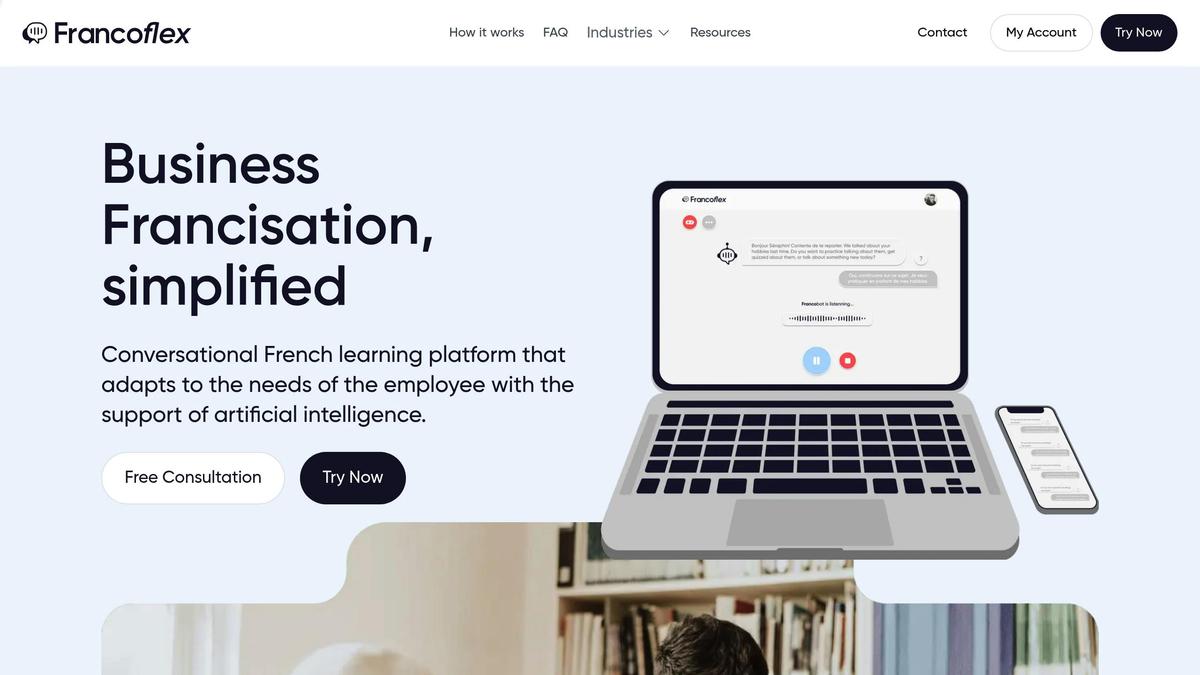AI-Enhanced French Training for Businesses
Explore how AI-enhanced French training helps businesses comply with Quebec's Bill 96 while improving employee skills and reducing costs.

Formation linguistique pour entreprises
Quebec's Bill 96 makes French the priority language for businesses, requiring companies to ensure all workplace communication is in French. Non-compliance can lead to fines up to $30,000 and even risk operating licences. Beyond legal obligations, French proficiency helps businesses integrate employees, retain talent, and access Quebec's predominantly French-speaking market.
Key Challenges with Traditional Training:
- High costs for group or individual sessions
- Lack of industry-specific vocabulary
- Limited access for remote or rural teams
- Inflexible schedules and low retention rates
How AI Solves These Problems:
- Tailored Learning: AI adapts to each employee's role, proficiency, and pace.
- 24/7 Access: Employees can train anytime, reducing workplace disruptions.
- Automated Compliance: AI tracks and reports progress to meet Bill 96 requirements.
- Cost Efficiency: Reduces training costs by up to 35%.
With AI tools like Francoflex, businesses can meet Bill 96 requirements efficiently while improving employee skills and cutting costs.
How do I learn French using Free AI tools and Applications as a Beginner?
How AI Improves Workplace French Training
Artificial intelligence is reshaping how French is taught in workplaces, addressing the challenges of traditional methods. Platforms like Francoflex use AI to provide training that’s tailored, accessible, and specific to the demands of various industries, adapting to each employee's unique needs and work environment.
Studies back up the effectiveness of AI in language learning. Research shows that 73% of students grasp concepts more effectively, and 63% find studying easier with AI tools [2]. This is largely because AI can analyze learning behaviours, adjust the difficulty of content, and offer instant feedback - features that traditional classrooms often struggle to deliver. These capabilities make it possible to create training programs that are finely tuned to the needs of specific industries.
Training Aligned with Industry Needs
AI takes workplace French training to the next level by focusing on the terminology and scenarios relevant to specific industries. Unlike generic language courses that centre on casual conversation, AI tools can identify the vocabulary and expressions employees need for their jobs. Using data, these systems adapt lessons to reflect the language demands of a particular sector [1], keeping training practical and relevant.
This approach is especially useful for Quebec businesses working to meet Bill 96 requirements. Employees can concentrate on learning the French needed for their specific roles, avoiding time spent on unnecessary vocabulary.
Learn Anytime, Anywhere with 24/7 Access
Traditional language tutoring often conflicts with the realities of modern business, especially for companies with shift workers or remote teams. AI tutors solve this problem by offering round-the-clock availability [3]. Employees can fit language learning into their schedules - whether it’s during a lunch break, after a night shift, or over the weekend [4].
The impact is clear. For instance, Purdue University reported a 20% reduction in wait times for human tutors because AI tools were able to handle basic questions [5]. This kind of accessibility transforms how employees integrate language learning into their daily lives.
Tailored Training for Every Employee
Under the strict requirements of Bill 96, ensuring that all employees meet language proficiency standards is critical. Each worker comes with a unique background, learning speed, and level of French proficiency. AI addresses this diversity by creating personalized learning paths. Francoflex, for example, adapts its programs to suit both the professional needs and language levels of its users. A Spanish-speaking employee, for instance, might face different challenges than a Mandarin or Arabic speaker, and AI can adjust accordingly.
Moreover, AI provides flexibility, allowing employees to learn at their own pace without being tied to instructor availability or rigid schedules [4]. The system continuously monitors progress, identifying areas that need extra attention and adjusting the learning plan to ensure steady improvement.
For businesses managing diverse teams under Bill 96, this personalized approach ensures that every employee gets the support they need. The result? Consistent French proficiency across the workforce and better compliance with Quebec's language laws.
Meeting Bill 96 Requirements with AI Tools
Quebec's Bill 96 brings a host of administrative and logistical challenges for businesses, as it mandates strict adherence to French language usage in the workplace. Companies are required to provide detailed documentation and regular progress updates to prove compliance. For large organizations or those with high employee turnover, this can quickly become an overwhelming task.
AI tools like Francoflex offer practical solutions to ease this burden. These platforms automate the tracking and reporting process, making it easier for businesses to manage and document their efforts. Instead of manually monitoring each employee’s progress, AI systems collect and organize learning data in real time, enabling businesses to generate accurate reports instantly.
Automated Progress Tracking and Reports
Traditional language training programs often involve a lot of manual work. Trainers must record attendance, test results, and completion rates, then compile all this information into reports for submission to the Office québécois de la langue française (OQLF). This process is not only time-consuming but also prone to errors.
AI-powered platforms eliminate these inefficiencies by automating the entire process. They track key metrics like lesson times, topics mastered, challenges faced, and skill development rates. All this data is then organized into detailed reports that meet the requirements of Bill 96.
Francoflex goes a step further by generating customized reports tailored for francization certification. These reports include individual progress, group performance metrics, and completion rates for required training modules. Beyond simple tracking, the platform identifies trends in learning behaviour, flags areas where additional support might be needed, and highlights potential compliance risks before they escalate.
For businesses with large teams, this scalability is a game changer. Francoflex can handle reporting for teams ranging from a single employee to as many as 50,000, all while maintaining precision and depth of detail.
Protecting Employee Data During Training
While automated reporting simplifies compliance, it also raises concerns about employee data security. Language training involves collecting sensitive information, such as skill levels, learning challenges, and personal progress. Quebec privacy laws and federal regulations like PIPEDA require businesses to safeguard this data and ensure it is used strictly for training purposes.
AI platforms address these concerns with robust security measures. Francoflex employs encryption and access restrictions to protect employee data. Individual results are anonymized in summary reports, allowing businesses to meet reporting requirements without exposing personal details.
Calculating Returns from AI Language Training
After exploring advancements in language training, it’s crucial to assess the return on investment (ROI). Evaluating the financial impact of your investment in French language training helps justify the costs. AI-driven language training offers measurable benefits that translate directly into tangible gains for businesses.
A straightforward formula can be used to calculate ROI: ROI (%) = ((Monetary Benefits – Training Costs) / Training Costs) x 100 [7]. According to a global IDC study (2023), for every dollar invested in AI, companies saw an average return of $3.50, with 5% of organizations achieving returns as high as $8 [8].
Measuring How Fast Employees Learn
The speed at which employees achieve operational proficiency in French significantly affects the ROI of training programs. AI-based training has been shown to improve retention by 40%, boost productivity by 50%, and reduce training time by 34% [11]. In one pilot program, participants achieved language proficiency four times faster than with traditional methods [7].
Francoflex monitors several key metrics to track progress, including lesson completion time, the number of topics mastered weekly, and skill development across various aspects of the French language. Companies should also measure skill levels using standardized tests before and after training, while keeping an eye on attendance rates, completion rates, and active participation during sessions [10].
This accelerated learning not only improves outcomes but also leads to significant cost savings, as outlined below.
Cost Comparison with Standard Training
Traditional French training methods come with considerable recurring costs. Expenses such as instructor fees, scheduling logistics, facility usage, and employee downtime can quickly add up.
AI-powered learning systems can reduce training costs by up to 35% [9]. These savings stem from eliminating many indirect expenses associated with conventional methods while simultaneously enhancing educational outcomes.
Scalability is another major advantage. While traditional training requires hiring additional instructors as team sizes grow, a platform like Francoflex can accommodate anywhere from a single employee to 50,000 without proportional cost increases. The personalized approach enabled by AI can increase engagement by up to 60% [9], leading to better employee retention and lower recruitment costs.
A real-world example of this is Komatsu Cummins Chile. Their training program achieved a customer satisfaction (CSAT) score of 97% and a Net Promoter Score (NPS) of 65%. Over 600 employees were trained, resulting in smoother internal communication and improved operational efficiency [6].
In line with Bill 96, AI-automated reporting also reduces administrative costs while ensuring compliance. Instead of relying on administrative staff to manually compile compliance reports, Francoflex generates these documents automatically, saving time and money while maintaining accuracy.
Additionally, the 24/7 availability of AI allows employees to train during off-peak hours or outside regular work schedules, minimizing disruptions to productivity.
Conclusion: Francoflex for Better Workplace French Training

Francoflex is redefining workplace French training by combining measurable cost savings with improved performance, all while ensuring compliance with Bill 96. Its AI-powered platform tailors learning experiences to each employee's native language, skill level, and workplace requirements, making French learning faster and more efficient than traditional methods.
The numbers speak for themselves. With AI-driven training, retention rates improve by up to 40%, while costs drop by 30% [12]. Francoflex also scales effortlessly, accommodating anything from a single employee to teams of 50,000, without the added expenses typically tied to hiring more instructors.
The platform goes beyond just teaching French. Automated progress tracking and reporting make it easy to stay compliant with OQLF requirements. It streamlines francisation plan documentation and ensures employees receive the mandated training within six months of being hired. Stéphane, a company president, sums it up well:
"Francoflex keeps us compliant with minimal expense." [13]
Another standout feature is the 24/7 availability of AI tutors, allowing employees to learn during quieter hours. This flexibility, paired with conversational AI that delivers instant feedback and personalized lessons, creates an engaging learning experience that traditional classrooms just can’t offer.
For businesses looking to enhance integration and operational efficiency, Francoflex checks all the boxes. José, a small business owner, highlights this dual advantage:
"This will help my business grow as I'll be able to send my workers to client's homes knowing they can communicate properly in French." [13]
With its cost-effective approach, automated compliance tools, and accelerated learning capabilities, Francoflex is a must-have for Canadian businesses navigating Quebec's language requirements. By aligning personalized training with workplace needs and regulatory demands, it sets the standard for efficient and effective francisation.
FAQs
How does Francoflex help businesses comply with Quebec's Bill 96 while supporting diverse teams?
Francoflex supports businesses in navigating the requirements of Quebec's Bill 96 by providing tailored French language training for diverse teams. The platform personalizes learning based on each employee's native language, current skill level, and specific work field, making the training both relevant and practical.
With 24/7 access, employees can fit language learning into their schedules seamlessly. Beyond training, Francoflex helps businesses by offering workplace document translation services and aligning internal policies with the new language rules. This not only ensures compliance but also promotes a more inclusive workplace.
What are the key advantages of AI-powered language training over traditional methods for workplace learning?
AI-powered language training brings a fresh edge to workplace learning by blending flexibility, customisation, and efficiency into the process.
These systems adjust to each employee’s native language, skill level, and specific professional needs, crafting a learning experience that feels tailor-made. This sort of personalised learning not only makes concepts easier to grasp but also speeds up progress. Employees can work through lessons at their own pace, which often leads to better retention and quicker mastery compared to the one-size-fits-all approach of traditional methods.
What’s more, AI tools are available around the clock, making them a perfect fit for busy professionals or global teams spread across time zones. The ability to learn anytime, anywhere, removes the need for rigid schedules. Plus, by cutting down on the need for in-person instructors and offering scalable training options, AI-powered solutions can trim costs without skimping on quality.
How does Francoflex ensure employee data and progress tracking are secure during language training?
Francoflex places a strong emphasis on data security and privacy, employing advanced encryption methods to safeguard all data during transmission and storage. The company adheres strictly to GDPR regulations and performs regular security audits to uphold top-tier protection standards.
When it comes to tracking employee progress, Francoflex ensures individual privacy is maintained by anonymizing personal data. This approach provides valuable performance insights while keeping sensitive information confidential, striking a balance between security and respect for privacy throughout the learning journey.






